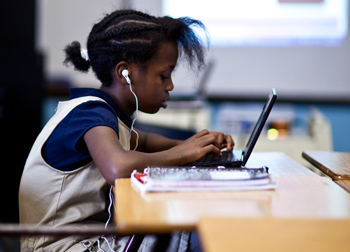
FRUSTRATION. Whether you are new to K-12 public education reform, have spent a career in it or have observed the headlines of this movement, as a concerned parent, citizen or taxpayer, a deep level of frustration inevitably comes over you as you witness the brokenness of America’s public education system and our inability to redeem and solve this problem.
Pockets of inspiration dot the landscape: choice to choose high performing charter schools like KIPP Schools; money to fund lower class sizes and innovative school-based programs and finally, human capital strategies such as Teach for America, all clearly demonstrate how individuals are making a difference in individual schools.However, these pockets remain just that…pockets. After 10+ years, successful charter schools serve less than 5% of the 50M children in K-12 public education.
We’ve doubled the amount we spend per pupil as a nation over the past two decades, yet, have nothing to show for it and cannot sustain growth in ineffective spending, let alone spending in general. There is no human capital strategy to produce 3.5M great teachers in every city, town, suburb and rural zip code in America. It is 2011 and we still do not have a major State, City or School District that consistently promotes and graduates all students across all races and economic classes.
Where is the public education solution that can both sustain and scale to the aspirations of our democracy?
HOPE. Online learning because of its technology platform represents the first truly scalable solution that can both dramatically improve productivity while at the same time lower costs. Sustainability lies in our ability to retrofit the best of virtual schooling with the best of traditional schooling – blending those things that only technology can do effectively (personalizing learning for each and every student) with those things that only an in-classroom teacher and not technology can do effectively (motivate, engage, inspire and coach students in their learning --personalizing instruction for each and every teacher).
I left my job as the Head of Alvarez & Marsal’s Education Turnaround Practice in January 2011. I had spent the past 8 years in the midst of some of the country’s most ambitious school district turnaround efforts ranging from St Louis (our first) to New Orleans (re-starting an entire city’s education system post-Katrina) to NYC (the largest school district in the country) to Washington, DC (historic mayoral takeover and appointment of Michelle Rhee as Chancellor) to Detroit (state takeover of the local school system) and many localities and States in between.
Despite the high profile nature of these turnaround engagements, the ability to sustain and/or scale these turnaround efforts to other cities remains deeply challenged. This holds true for every sector of our public society where the change is largely top-down driven by a few committed, driven and fearless leaders. These top-down driven strategies can be remarkably effective in the short run, but, unfortunately, incredibly hard to sustain and scale in the long run. Public Education is a “long run” institution that must endure for generations, but has a “short run” crisis and mandate to educate the next generation now. We cannot wait for solutions to sustain and scale over decades. Our children demand a solution now.
I created a new organization, Matchbook Learning, whose premise is to bring the powerful technologies of online learning into bricks and mortar turnaround schools and classrooms by focusing on the bottoms-up capacity building that must occur by the adults in the school, to ensure that the technology solution fits, personalizes and scales.
We believe that a hybrid or blended model of school can leap frog the productivity of teachers, who in turn can leap frog the productivity of students while lowering costs, building grassroots support and creating momentum. We believe hybrid or blended models are sustainable if designed from the ground (i.e. classroom) up and can scale if that design is properly implemented with capacity building and coaching throughout its implementation.


